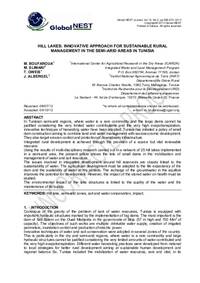Hill lakes : innovative approach for sustainable rural management in the semi-arid areas in Tunisia

Authors:
In Tunisian semi-arid regions, where water is a rare commodity and the large dams cannot be
justified considering the very limited water contributions and the very high evapotranspiration,
innovative techniques of harvesting water have been adopted. Tunisia has initiated a policy of small
dam construction aiming to combine land and water management with socioeconomic development.
They also target erosion control and protection of downstream infrastructure.
Integrated rural development is achieved through the provision of a scarce but vital renewable
resource.
Using the results of multi-disciplinary research carried out in a network of 25 hill lakes implemented
in a semi-arid area, the present article shows the role of small dams in the mobilization and
management of water and soil resources.
The issues involved in integrated development around hill reservoirs are closely linked to the
sustainability of water. The agricultural development must be adapted to the life expectancy of the
dam and the availability of water in dry periods. The recharge of the groundwater in the aquifers
improves the potential for development. However, the impact of the stored water on health must be
studied.
The environmental impact of the lake structures is linked to the quality of the water and the
maintenance of its supply.
